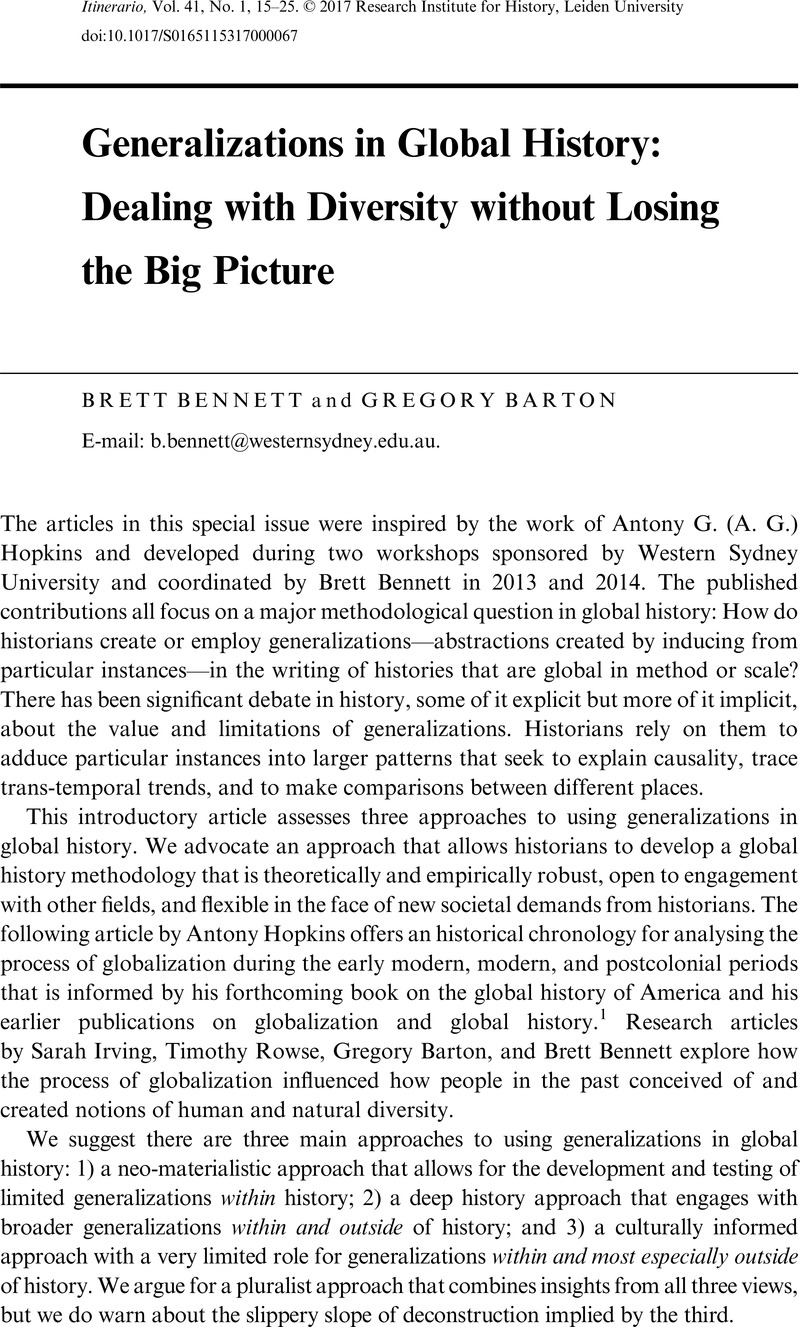No CrossRef data available.
Article contents
Generalizations in Global History: Dealing with Diversity without Losing the Big Picture
Published online by Cambridge University Press: 07 April 2017
Abstract
An abstract is not available for this content so a preview has been provided. Please use the Get access link above for information on how to access this content.

- Type
- Introduction
- Information
- Itinerario , Volume 41 , Special Issue 1: Knowledge Brokers and Knowledge Production in Colonial Orders , April 2017 , pp. 15 - 25
- Copyright
- © 2017 Research Institute for History, Leiden University
References
Bennett, Brett. Plantations and Protected Areas: A Global History of Forest Management. Cambridge: MIT Press, 2015.Google Scholar
Christian, David. Maps of Time: An Introduction to Big History. Berkeley: University of California Press, 2004.Google Scholar
Conrad, Sebastian. “Enlightenment in Global History: A Historiographical Critique.” American Historical Review
117 (2012): 998–1027.Google Scholar
Conrad, Sebastian. What is Global History?
Princeton: Princeton University Press, 2016.Google Scholar
Cook, Harold J. Matters of Exchange: Commerce, Medicine, and Science in the Dutch Golden Age. New Haven: Yale University Press, 2007.Google Scholar
Guldi, Jo and Armitage, David. The History Manifesto. Cambridge: Cambridge University Press, 2014.Google Scholar
Hodge, Joseph M. Triumph of the Expert: Agrarian Doctrines of Development and the Legacies of British Colonialism. Athens: Ohio University Press, 2007.Google Scholar
Hopkins, A. G. ed. Global History: Interactions between the Universal and the Local. Basingstoke: Palgrave Macmillan, 2006.Google Scholar
Irving, Sarah. “
An Empire Restored: America and the Royal Society of London in the Restoration.” In America in the British Imagination, edited by R. Fagge, T. Lockley and C. Armstrong, 27–47. Newcastle: Cambridge Scholars, 2007.Google Scholar
Latour, Bruno. “Why Has Critique Run out of Steam? From Matters of Fact to Matters of Concern.” Critical Inquiry
30:2 (2004): 225–248. Lester, Alan. “Imperial Circuits and Networks: Geographies of the British Empire.” History Compass 4:1 (2006): 124–41.Google Scholar
Martinez, Alberto A. The Cult of Pythagoras: Math and Myths. Pittsburgh: University of Pittsburgh Press, 2012.Google Scholar
Pinker, Steven. The Better Angels of Our Nature: Why Violence Has Declined. New York: Viking, 2011.Google Scholar
Porter, Theodore M. Trust in Numbers: The Pursuit of Objectivity in Science and Public Life. Princeton: Princeton University Press, 1995.Google Scholar
Rowse, Timothy. “Global Indigenism: Genealogy of a Non-Racial Category.” In Rethinking the Racial Moment: Essays on the Colonial Encounter, edited by Alison Holland and Barbara Brookes, 229–254. Newcastle: Cambridge Scholars, 2011.Google Scholar
Vries, Jan de. “Reflections on Doing Global History.” In Writing the History of the Global: Challenges for the 21st Century, edited by M. Berg, 32–47. Oxford: Oxford University Press, 2013.Google Scholar
Vries, P. H. H. Escaping Poverty: The Origins of Modern Growth. Vienna: Vienna University Press, 2013.Google Scholar
Vries, P. H. H. State, Economy and the Great Divergence: Great Britain and China, 1680s–1850s. London: Bloomsbury, 2015.Google Scholar




